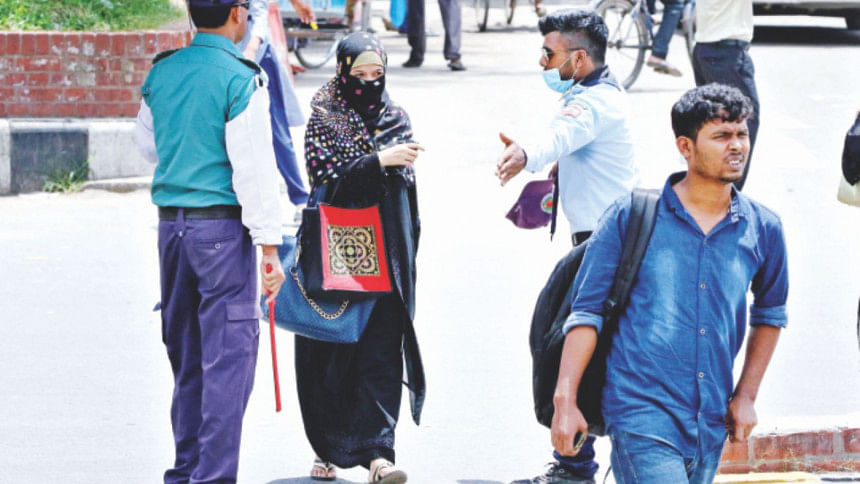The mindset needs to change first

It was around 11:30am yesterday.
A Rover Scout was requesting drivers to properly line up their vehicles stuck in jam at the capital's Shahbagh intersection. All of a sudden, a motorcycle came through the gaps and drove to the other side of the road.
Utterly frustrated, the sunburnt volunteer, in his early 20s, kept staring at the bike until it disappeared.
“When will they stop?” the youth, named Shahriar Imtiaz, asked and sighed wearily. “People keep breaking [traffic] rules despite our repeated requests. Controlling traffic and pedestrians is a massive task.”
Amid such a situation, around 440 Rover Scouts deployed at eight key points of the city to assist traffic police were withdrawn yesterday, the last day of the Traffic Week.
Apart from educating drivers and their helpers about traffic rules, the volunteers also made pedestrians use footbridges and zebra crossings during the Week beginning on August 5.
The Dhaka Metropolitan Police announced the Week amid an unprecedented student protest for road safety measures. The demonstration began after a bus ploughed into a crowd and killed two college students on Airport Road on July 29. The Week was later extended by three days.
For the last 10 days, the volunteers braved rain and heat to control traffic. They also requested people to queue up and wait in designated spots while waiting for public transport. At many places, they prevented jaywalking.
Many followed their instructions while others ignored.
Talking to The Daily Star yesterday, some of the Rover Scouts highlighted the tendency of many drivers and pedestrians towards breaking traffic rules.
“Whenever the drivers and pedestrians see us or the police, they try to follow the rules. However, pedestrians jaywalk and vehicles go on the wrong side [of the road] when we are not around,” said Abdur Rahman, another volunteer near the Shahbagh intersection.
He said the mindset needs to change first.
Several other Rover Scouts deployed at other city points echoed Abdur's view on the matter.
Abdur, however, said there were many who tend to follow traffic rules and wait for buses at the designated places. “It's a positive sign”.
A volunteer, working near Karwan Bazar, claimed that the traffic situation improved in the Traffic Week.
“Initially we had to hold people by their hands to stop them from jaywalking. But now many listen to our instructions,” he said.
While this correspondent was talking to the Scout around 2:30pm, a couple along with a baby was trying to cross the busy Kazi Nazrul Islam Avenue, risking their lives.
Within no time, another volunteer, named Anjuman Nahar Shanta, went near the couple and smilingly requested them to use a nearby zebra crossing.
Minutes later, Shanta was seen requesting a youth to remove his headphone while he was crossing the road. Asked, the youth, who introduced himself as Bimol and an employee of a private firm, claimed he did not know crossing roads wearing headphones was illegal.
The Rover Scouts said it was important that the authorities repaint all the zebra crossings and bus stop signs and also build more footbridges in the city. They also stressed the need for raising awareness among people about road rules.
Traffic inspector Monir Hossain thanked all the volunteers for their help during the Traffic Week. He said they really worked hard to make people abide by the traffic rules.
Meanwhile, a traffic policeman deployed in Karwan Bazar area said the situation on the streets might turn as usual as the volunteers would be withdrawn.
Wishing not to be named, he said it was impossible to control traffic and pedestrians with the existing manpower of traffic police.
His apprehension matches a primary assessment of Bangladesh Scouts.
“The number of traffic police members is very inadequate. Also, a change in the mentality of people and transport workers is a must [to change the situation],” said Golam Mostafa, director (community development and Health) of Bangladesh Scouts. He coordinated the activities of the Scouts during the Traffic Week.
Golam said they would hold an evaluation meeting on Thursday which would be attended by officials from the Prime Minister's Office and other government offices.
Eight separate groups, who were deployed in the eight city points, would come up with their recommendations in the meeting, he said, adding that they would submit a report to the authorities concerned later.

 For all latest news, follow The Daily Star's Google News channel.
For all latest news, follow The Daily Star's Google News channel. 



Comments